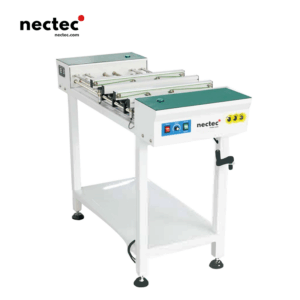In the fast-paced world of modern manufacturing, industries are constantly on the lookout for ways to enhance efficiency, accuracy, and productivity. One of the standout innovations in this realm is the rotary pick and place machine. These machines have transformed the way products are assembled, packaged, and transported, reshaping manufacturing processes across various sectors.
Understanding Rotary Pick and Place Technology
To appreciate the significance of rotary pick and place machines, it’s essential to understand how they work. These machines utilize a rotating mechanism to pick up components from one location and place them in another. This method is particularly advantageous as it allows for high-speed operations, seamlessly accommodating varying product sizes and shapes.
Key Components of Rotary Pick and Place Machines
- Rotary Tables: The heart of the machine, these tables rotate to create a cycle of picking and placing operations in a continuous flow.
- End Effectors: Equipped with specialized grippers or suction devices, these are pivotal in ensuring that components are securely picked up and accurately placed.
- Sensors and Vision Systems: These technologies enable the machine to identify objects, ensuring precision and reducing errors in the pick-and-place process.
- Control Systems: Advanced control systems manage the entire process, allowing for customization and programmability to fit specific production needs.
Advantages of Rotary Pick and Place Machines
Manufacturers are increasingly adopting rotary pick and place machines due to the myriad benefits they offer:
1. Increased Efficiency
The ability to perform multiple operations in a continuous cycle makes rotary pick and place machines exceedingly efficient. This efficiency translates to shorter production times and reduced operational costs.
2. Versatility
Rotary pick and place machines can be equipped to handle a wide range of products. Whether it’s small electronic components, food items, or larger pieces in automotive manufacturing, these machines can adapt to various sizes and weights.
3. Enhanced Precision
With integrated sensors and sophisticated control systems, these machines provide a level of precision unmatched by manual processes. This feature drastically reduces the risk of errors, which is critical in high-stakes manufacturing environments.
4. Compact Design
Manufacturing facilities are often limited in available space. Rotary pick and place machines are designed to be compact, making them suitable for even the most space-restricted environments.
Applications Across Industries
The versatility of rotary pick and place machines allows them to find applications across various industries:
1. Electronics
In the electronics sector, these machines are used for assembling circuit boards, placing components with high precision, and enhancing workflow. The need for speed and accuracy in this field makes rotary machines invaluable.
2. Food and Beverage
Food packaging lines benefit immensely from rotary pick and place machines, where speed and hygiene are paramount. These machines help in placing bottles, jars, and containers with minimal human contact, ensuring cleanliness and efficiency.
3. Automotive
In automotive manufacturing, rotary pick and place machines assist in assembling parts such as engines and transmissions. Their ability to handle heavy components while maintaining precision is crucial in this industry.
Choosing the Right Rotary Pick and Place Machine
When selecting a rotary pick and place machine, manufacturers should consider several critical factors:
1. Production Volume
The expected volume of production should guide the choice of machine. Higher volumes may necessitate more robust and faster machines.
2. Product Type
Understanding the type of products being handled is crucial. The machine must be equipped with appropriate end effectors and configurations suitable for the specific products.
3. Space Constraints
The available space within the manufacturing facility would limit machine selection. Compact models may be necessary for smaller facilities.
4. Integration Capabilities
It is important to ensure that the machine can easily integrate into existing production lines and workflows. Compatibility with other machinery and software systems plays a significant role in this process.
Future Trends in Rotary Pick and Place Technology
The world of rotary pick and place technology is evolving rapidly, with several trends emerging:
1. Automation and AI
As automation continues to take center stage in manufacturing, the incorporation of artificial intelligence into rotary pick and place machines is anticipated. AI can enhance decision-making processes and improve adaptability to changing production needs.
2. Enhanced Robotics
Future machines will likely benefit from advanced robotic technologies, allowing for greater flexibility and efficiency. The integration of collaborative robots (cobots) could further enhance human-robot interactions in production lines.
3. Sustainability Efforts
In response to the growing focus on sustainability, the next generation of rotary pick and place machines is expected to focus on energy efficiency and the use of sustainable materials in their manufacturing.
Final Thoughts
The rotary pick and place machine is a significant innovation in the manufacturing sector that is continually evolving. As industries strive for greater efficiency and precision, the role of these machines will only increase, paving the way for a more productive future.











